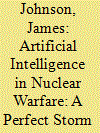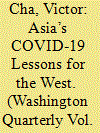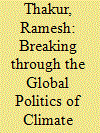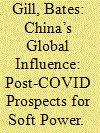|
|
|
Sort Order |
|
|
|
Items / Page
|
|
|
|
|
|
|
| Srl | Item |
| 1 |
ID:
174237


|
|
|
|
|
| Summary/Abstract |
A significant gap exists between the expectations and fears of public opinion, policymakers, and global defense communities about artificial intelligence (AI) and its actual military capabilities, particularly in the nuclear sphere. The misconceptions that exist today are largely caused by the hyperbolic depictions of AI in popular culture and science fiction, most prominently the Skynet system in The Terminator.
|
|
|
|
|
|
|
|
|
|
|
|
|
|
|
|
| 2 |
ID:
174229


|
|
|
|
|
| Summary/Abstract |
Epidemiologists universally acknowledge that communities in Asia including in Hong Kong, Singapore, South Korea, Taiwan, and Vietnam have been more successful than the United States and most European countries in “flattening the curve” and limiting the spread of the COVID-19 virus among its populations. Despite the relative proximity of human-to-human transmission with China, the total number of cases and deaths as of May 2020 for these five countries is unusually small compared to the United States, Italy, and other European states. South Korea discovered its first positive case within one day of the United States but slowed the infection rate by the end of February. The United States, by contrast, exceeded 1.1 million cases and was still on the incline in late April. Singapore has demonstrated the lowest mortality rate for the virus and succeeded in initially suppressing infection rates with quarantines and social distancing. And all these Asian societies have managed to maintain some degree of normalcy and economic well-being compared with the lockdown and economic freefall in the United States.
|
|
|
|
|
|
|
|
|
|
|
|
|
|
|
|
| 3 |
ID:
174230


|
|
|
|
|
| Summary/Abstract |
In preparation for the UN discussions in September and the Madrid climate conference in December, a spate of reports warned that the natural environment and ecological systems that sustain all forms of life are collapsing. 1 Laurie Laybourn-Langton, lead author of a report from the Institute for Public Policy Research (IPPR) in February 2019, wrote that “the environment is breaking down, with consequences which include more drought, famine, forced migration and war. Environmental breakdown poses a catastrophic risk.”
|
|
|
|
|
|
|
|
|
|
|
|
|
|
|
|
| 4 |
ID:
174232


|
|
|
|
|
| Summary/Abstract |
While the world’s health continues to suffer from COVID-19, on pace to be the deadliest pandemic since the outbreak of HIV/AIDS in the early 1980s, great-power competition is alive and well. It is, quite literally as the British say, in rude health. The COVID-19 crisis has injected an already-inflamed US-China relationship with new levels of ill will as each side blames the other for the disease’s spread and struggles to spin global opinion in their favor. The stakes grow ever higher as the blame game further aggravates US-China competition over matters of governance, values, and ideals.
|
|
|
|
|
|
|
|
|
|
|
|
|
|
|
|
| 5 |
ID:
174236


|
|
|
|
|
| Summary/Abstract |
As part of a nuclear security summit in 2016, fifty world leaders participated in a crisis simulation of a radiological terrorist attack. According to the scenario, the radiological material was stolen from a hospital and sold via the Dark Web to a terrorist group that delivered it using a drone against a civilian target. 1 The scenario, while fictional, was firmly rooted in technological developments that present a new range of challenges to preventing non-state actors from acquiring and using chemical, biological, radiological, and nuclear (CBRN) weapons.
|
|
|
|
|
|
|
|
|
|
|
|
|
|
|
|
| 6 |
ID:
174234


|
|
|
|
|
| Summary/Abstract |
“Great power competition” has, at least on paper, become the orienting principle for American strategy. That competition is usually defined as being between the United States and China as well as between the United States and the Russian Federation. Or it lumps them together in the vague category of “great powers,” without much additional context. But a critical and underexamined factor in the current global geopolitical landscape is the relationship between Beijing and Moscow and how their ties affect US strategy toward each of them individually and together
|
|
|
|
|
|
|
|
|
|
|
|
|
|
|
|
| 7 |
ID:
174233


|
|
|
|
|
| Summary/Abstract |
Geopolitical competition increasingly takes place not on the battlefield but in a tightly networked global economy. As distinctions between economic and national security collapse, governments are embracing economic statecraft as a vital element in their foreign policy toolkits. They are learning how to weaponize the interdependencies produced by economic globalization and how to leverage their positions in networks to manipulate and coerce other states.
|
|
|
|
|
|
|
|
|
|
|
|
|
|
|
|
| 8 |
ID:
174231


|
|
|
|
|
| Summary/Abstract |
A central distinction between authoritarian and democratic systems is their view of information. Democracies believe in—and depend on—the open and free exchange of information that empowers citizens to make informed decisions to select their representatives and engage in political debate. 1 They champion freedom of expression, association, and press as universal rights. The International Covenant on Civil and Political Rights captures this vision: “Everyone shall have the right to freedom of expression; this right shall include freedom to seek, receive and impart information and ideas of all kinds, regardless of frontiers, either orally, in writing or in print, in the form of art, or through any other media of his [sic] choice.”
|
|
|
|
|
|
|
|
|
|
|
|
|
|
|
|
| 9 |
ID:
174228


|
|
|
|
|
| Summary/Abstract |
The ongoing pandemic crisis is likely to reshape many national policies and social habits, and foreign policy will be no less affected than other areas. Given the massive and ongoing costs of the crisis and the renewed focus on the security of the US homeland, American popular opinion could turn dramatically against global engagement and defense spending.
|
|
|
|
|
|
|
|
|
|
|
|
|
|
|
|
| 10 |
ID:
174235


|
|
|
|
|
| Summary/Abstract |
In June of 2019, the New York Times reported that the United States was “stepping up digital incursions into Russia’s electric power grid in a warning to President Vladimir V. Putin.” 1 The reporters accused the United States of planting malware within Russian critical infrastructure under new authorities granted by the White House to the Department of Defense (DoD) for offensive cyber operations. According to the article, the acts were part of a new US strategy to use cyber operations to signal capabilities and therefore deter further Russian incursions into US critical infrastructure, 2 indicating that strategic cyber attacks—those that create immediate physical violence to large segments of civilian population or attacks that affect a state’s ability to control its nuclear forces—were now credible arrows in the US foreign policy quiver against Russia.
|
|
|
|
|
|
|
|
|
|
|
|
|
|
|
|
|
|
|
|
|